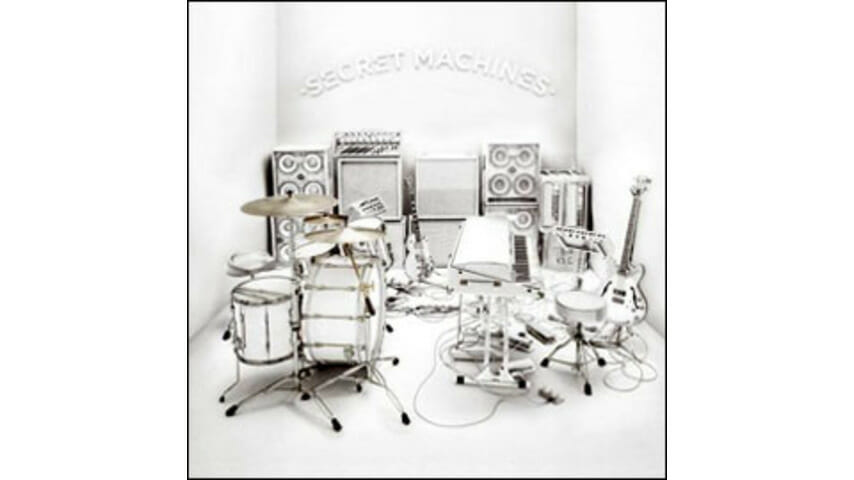These jittery times have resulted in a new genre—let’s call it “dread rock.” Prime examples include Wilco’s celebrated Yankee Hotel Foxtrot and The Honeydogs’ little-heard 10,000 Years, but you can feel the undercurrents in much of today’s more thoughtful popular music. Anxiety flutters through Now Here Is Nowhere—the first full-length from The Secret Machines—like the dead leaves that comprise one of the album’s numerous recurring images of encroaching winter and time’s slippery nature.
“First wave down,” sings a spooked Ben Curtis in “First Wave Intact,” which opens the record, “As leaves from modern trees / Rest on walls like these.” The language may be cryptic, but drummer Josh Garza’s crunching martial beat, Curtis’ hectoring guitar riff and brother Brandon Curtis’ shuddering electronics, which drive the track through its nine-minute course, send a clear message: Beware, for the familiar is about to grow alien, there’s no longer any comfort zone and we have no one to blame but ourselves and those who lead us. This is possibly one of the most harrowing protest songs I’ve ever heard, and unquestionably one of the most convincing. “You talk politics with somebody, and immediately it becomes like a war of semantics,” Brandon Curtis writes on the band’s website, “But somehow, if you can color around the issue with music and metaphor and lyrics, maybe you’re able to communicate a little better.”
The trio, who relocated from Dallas to New York City in 2000, have much in common with The Flaming Lips and Grandaddy, in that all three examine the struggle of coming to grips with contemporary existence. But while Wayne Coyne and Jason Lytle enclose their disturbing subject matter in lush pop melodies, The Secret Machines offer no solace, they just lay it out there, thorny, bitter and overwhelming—take it or leave it. Some of the material is overtly apocalyptic in nature: The savage refrain of “The Road Leads Where It’s Led” is “Blowing all the other kids away,” while the principals in the Floydian “Pharaoh’s Daughter” are “dressed in uniforms left over from the war.” On “Nowhere Again,” the album’s most accessible track, the images are closer to home but still enigmatic; the most indelible of these pictures is a woman lifting her dress up, but it’s unclear whether she’s being seductive or running to get out of the rain. Talk about stacking up the metaphors. “Another alone on an everyday night,” Ben Curtis laments in the song’s central passage, “Thinking the morning / Looking for alright.”
The band’s uncompromising vision results in an album of harsh beauty, a sort of postmillennial equivalent of The Wall, its psychological payload rendered that much more ominous by the perilous state of the world. This isn’t a cautionary fable; it’s a split hair from reality. There is, however, a glimmer of hope in the closing “Now Here Is Nowhere,” which recasts the somber music of “First Wave Intact” as a sort of rock symphony for the brave new world, its jaunty groove and accompanying references to rebirth (“The newly born in the hardly there”) perhaps intimating the possibility that humankind is capable of coming out the other side of this mess after all, and that the center may hold yet again.
